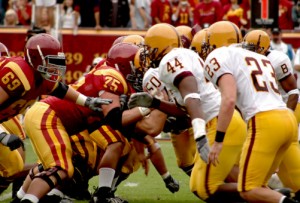After several months of negotiation, it looked as though the National Football League might finally come to a financial agreement with the many victims of concussion and other brain trauma, whose stories have been emerging in the past two years.
The attorney teams for prosecution and defense submitted their agreed upon settlement of $765 million to federal court this month. But after reviewing the detailed payout plan, which is meant to last for the next 65 years, U.S. District Judge Anita Brody denied approval.
Coming to Terms
The headline on this ruling initially caused some indignation; readers assumed that Judge Brody found the settlement too large. In fact, it was just the opposite.
Judge Brody expressed her doubt that $765 million would be sufficient to cover the needs of all the living players, and the families of those whose brain injuries have already proved fatal.
At this point, the number of plaintiffs in the suit total over 4,800, in addition to 1,000 of their family members. This reflects only the number of those who are part of the settlement with the NFL; the number of former NFL players eligible to receive benefits from the settlement is 20,000 in total.
 How the Numbers Play Out
How the Numbers Play Out
The plan was to gauge payouts on the basis of each plaintiff’s age and medical diagnosis. For example, retired players with serious dementia would receive $3 million, while younger players with Lou Gehrig’s disease would be compensated $5 million. Those without symptoms would be awarded enough to get baseline screening and follow-up care, if it proved necessary.
Counted into the proposed settlement was$675 million for compensatory claims for players with neurological symptoms and $75 million for testing those not showing symptoms. Medical research and education also factored in at $10 million.
The Dilemma
Despite the high amount (which is non-inclusive of legal fees and expenses of going to trial), NFL commissioners now find themselves in the position of defending the amount to the critical public.
While the plaintiffs’ attorneys undoubtedly would be thrilled to receive more, there is also the question of time. Until the matter is resolved, the retired players and their families are suffering the additional burden of waiting for the help and compensation they need to recover their lives.
The Options
The case comes to a crossroads. The opposing attorney teams could renegotiate the settlement to the court. Judge Brody, after denying the proposed amount, asked for more data and documentation that would prove $765 million was sufficient to cover the needs of all former players. The division of funds could be adjusted, allocating less to medical research, for example, and increasing the amount given to players’ health expenses.
Another alternative is that the settlement could be increased. That is, if NFL owners are willing.
If these two options fail to work, the NFL and retirees’ lawyers would have to return to litigation. Going back to the drawing board has its risks. While popular opinion, media disposition, and even ethical standards are against the NFL owners, proving their liability was a difficult battle for prosecuting attorneys. Starting the process all over again could lose some of the ground they’ve gained. The claims of certain players could even be undermined by the statutes of limitations.
How Did It Get To This?
Head injuries are common, and even expected, in a pro football player’s career. But, as Ali Rogers writes in a guest post for the NFL Concussion Litigation’s home site:
“We set aside the physical, psychological, and cognitive repercussions of blows to the head because admitting something might be wrong shows weakness. We somehow allow our priorities to fall in the wrong order, sacrificing the well-being of athletes while deeming the most aggressive players as the most valuable players.”
The Importance of Getting Help
Most victims of brain trauma have a lot less reason to anticipate their injury than NFL players do. The case between NFL owners and retired players shows the vital importance of having an expert legal team on your side, to help you win the resources you need to recover your life. If you need help in a case of brain injury, call Stephen M. Smith at 757-244-7000 for a no-cost, no-obligation consultation, or fill out the Free Case Review form on the left side of this page.


